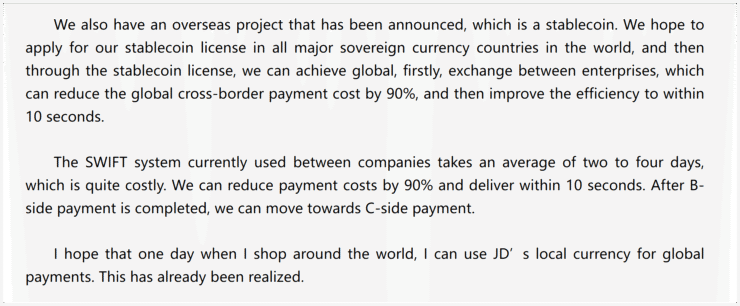Chinese tech conglomerate JD.com is preparing a major leap into the stablecoin arena, aiming to secure regulatory licenses across leading sovereign currency jurisdictions. The move—unveiled by company founder Liu Qiangdong at a Beijing media event on Tuesday—signals JD’s ambition to revolutionize cross-border payments through blockchain-based digital assets.

The announcement comes on the heels of the U.S. Senate’s passage of the GENIUS Act, a pivotal federal framework that lays the groundwork for the legal adoption and oversight of payment stablecoins. The timing underscores a growing global alignment around the next generation of digital currency infrastructure.
According to Liu, JD.com’s stablecoin initiative is engineered to dramatically streamline international transactions. “We can cut global payment costs by 90% and finalize transfers in under 10 seconds,” he said—drawing a direct contrast with the days-long settlement cycles of traditional systems like SWIFT.
JD’s push for stablecoin licensing marks a broader strategic pivot beyond e-commerce. The firm sees tokenized assets as a foundational element of global logistics and finance, positioning itself to compete with both fintech upstarts and legacy payment rails.
JD Targets Consumers After Initial B2B Stablecoin Launch
JD.com’s stablecoin strategy may soon extend beyond corporate transactions into the hands of everyday consumers. Speaking at the Beijing event, Liu Qiangdong revealed that while the initial rollout will focus on business-to-business (B2B) use cases, the company envisions a gradual transition toward retail adoption. “Once we’ve proven the model for B-side payments, we’ll look toward expanding on the consumer front,” Liu stated, signaling a two-phase approach.
Despite the bold ambition, Liu acknowledged the risks. “This could succeed—or it could fail. That’s the nature of business,” he admitted, underscoring the experimental tone of JD.com’s broader digital finance push.
The company’s move is part of a wider globalization strategy rooted in its core strength: supply chain infrastructure. Liu emphasized that JD.com has no intention of chasing speculative trends. “We’re not jumping into new business models anymore. Instead, we’ll double down on our existing ecosystem and scale it globally,” he said, referring to the company’s logistics, retail, and fintech platforms.
Meanwhile, China is advancing its own sovereign digital currency ambitions. On Wednesday, People’s Bank of China Governor Pan Gongsheng announced plans for a new international operations center for the digital yuan in Shanghai. The move is part of Beijing’s larger effort to reduce reliance on the U.S. dollar and promote cross-border use of its central bank digital currency (CBDC).
JD.com is no stranger to digital currency adoption. Back in 2021, the company began using China’s Digital Currency Electronic Payment (DCEP) system for internal payroll, vendor settlements, and interbank transactions—laying the foundation for its stablecoin experiment today.
Global Stablecoin Momentum Grows With New Regulatory Tailwinds
JD.com’s stablecoin ambitions are emerging at a pivotal time for the sector, as global interest in stablecoin infrastructure intensifies following major regulatory developments.
In the United States, momentum surged this week with the Senate’s passage of the GENIUS Act—short for Guiding and Establishing National Innovation for U.S. Stablecoins. The bill lays the groundwork for a federal framework governing the issuance and oversight of payment stablecoins, signaling Washington’s growing appetite to formalize the digital dollar landscape.
Initially stalled in May amid concerns over former President Donald Trump’s links to the crypto industry—including his family’s alleged ties to stablecoin issuer World Liberty Financial—the bill made a comeback in the Senate. A 68–30 vote last week cleared the path for full debate, culminating in its passage on Tuesday.
Despite clearing the Senate, the GENIUS Act is expected to encounter tougher scrutiny in the Republican-controlled House, where intra-party dynamics and broader regulatory hesitations may slow its advancement.
Quick Facts
- JD.com plans global stablecoin licensing to reduce payment costs.
- Founder Liu Qiangdong expects near-instant, low-cost cross-border transfers.
- The GENIUS Act’s U.S. Senate passage adds global regulatory momentum.
- China’s central bank pushes international adoption of the digital yuan.





